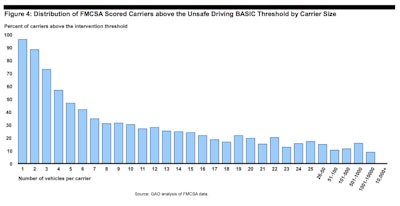
 This chart, from the GAO’s report, shows that one-truck owner-operators who’ve received an Unsafe Driving BASIC score have an astronomically higher chance of being above the intervention threshold in that category than all other size carriers, especially those with more than 25 trucks.
This chart, from the GAO’s report, shows that one-truck owner-operators who’ve received an Unsafe Driving BASIC score have an astronomically higher chance of being above the intervention threshold in that category than all other size carriers, especially those with more than 25 trucks.The scoring system used by the Federal Motor Carrier Safety Administration in its Compliance, Safety, Accountability system is flawed and is made up of an incomplete data set, concludes a Government Accountability Office report released Feb. 3. The GAO also concluded the program is particularly unfair for small carriers.
The GAO report, “Modifying the Compliance, Safety, Accountability Program Would Improve the Ability to Identify High Risk Carriers,” also recommends FMCSA change the system, due to various shortcomings the GAO found in its study, most of which stem from the quality of the data used by the agency to score carriers.
The GAO report’s findings are in line with Overdrive findings in spring of 2013, upon analyzing CSA data from its first two years in creating the CSA’s Data Trail site. Click here to see it.
Industry trade groups like the Owner-Operator Independent Drivers Association and the American Trucking Associations — often loud critics of the agency’s carrier scoring program — both have expressed agreement with the study’s findings.
The GAO report, while seemingly a proponent of CSA’s mission of scoring carriers as an attempt to target unsafe ones, identifies several key problems with CSA and its Safety Measurement System scoring method. These problems “raise questions about whether SMS is effectively identifying carriers at highest risk for crashing in the future,” GAO’s report says.

The GAO study found that:
-The data being used to score carriers is inconsistent, due to variances in inspection and enforcement policies state to state.
-Scores for small carriers are likely to be inflated by FMCSA’s methodology and are prone to significant fluctuations, given the limited data available for them, and a sam;l carrier therefore could have a hard time overcoming an inspection report that at once establishes a score and elevates it above a BASIC’s threshold for intervention.
-Some data used to calculate scores in the Unsafe Driving BASIC (behavioral analysis and safety improvement category) and the Crash Indicator BASIC are self-reported and therefore subject to inaccurate, missing or misleading reports from carriers.
-A large chunk of the regulations used in SMS score calculations aren’t violated enough to strongly associate them with crash risk. The GAO determined 593 of the 750 violations it studied were violated by less than 1 percent of carriers.
-There’s a general lack of correlation between SMS scores and crash occurrence, as a majority of high risk carriers have not crashed at all.
ATA and OOIDA both say in statements they agree with the study’s findings. ATA further said FMCSA should remove carriers’ scores from public view, as it allows third parties to make “erroneous judgments based on inaccurate data,” said ATA’s Chief of National Advocacy, Dave Osiecki.
Tom Sanderson of the Alliance for Safe, Efficient and Competitive Truck Transportation, who has an ongoing lawsuit against CSA, said the study “is emphatic in making [the] point” that the SMS scoring is “biased against small carriers.” Sanderson also said the scoring should be removed from public view.
“FMCSA should live up to its federal duty to determine which carriers are safe to operate on the highways and shut down the unsafe operators,” Sanderson said.
Click here to see GAO’s report.








